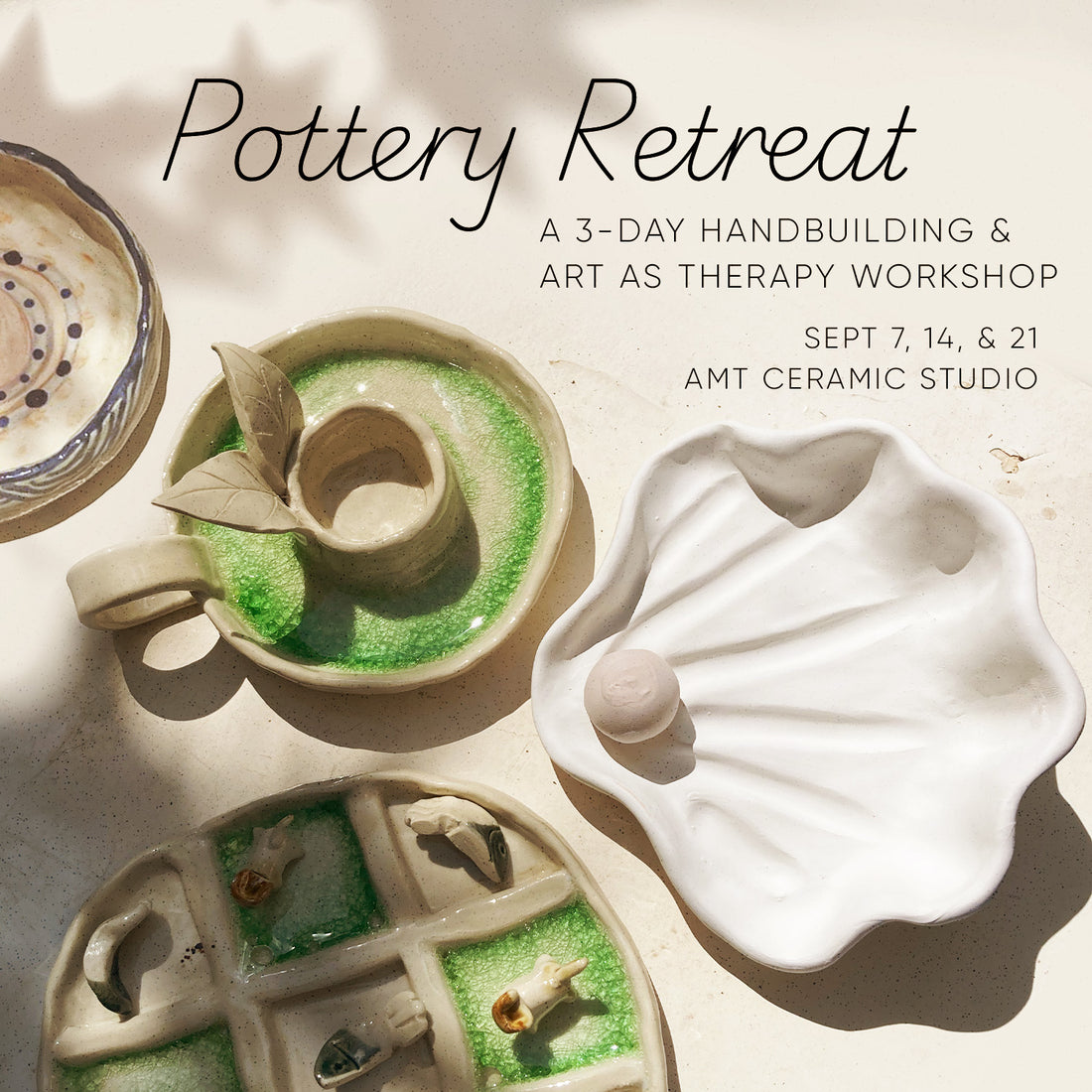
Article 8: AMT Ceramics' Artist Feature for AUGUST | Liz Rañola - Expressive Arts Practitioner
AMT Ceramics AdminShare
Year 2021 when we opened our studio to the public. It has been one of my dreams to collaborate with my fellow artists in different disciplines, most especially those who had been part of my student life in UPCFA and are now art practitioners as well.
In our Artist Feature for the month of August is Liz Rañola, a friend and classmate of mine in UPCFA Visual Communication. It was only later after the pandemic that I found out Liz had integrated her learnings and experience beneficially in using art as a form of therapy. Through Expressive Art, Liz has become a Certified Expressive Art Facilitator and a Psychological First Aider. Thus, the AMT Ceramic Studio had launched a collaboration project, "Pottery Retreat" to showcase her expertise in this form of Art as Therapy. This project includes a three-day (three Saturdays) Handbuilding and Art as Therapy workshops to be conducted in three Saturdays (September 7,14 & 21); being a new list from series of workshops offered by the Studio.

Liz Rañola
Let's learn more about Liz Ranola as she shares her thoughts about Expressive Arts. The following Q & A in this article will elucidate more information about this Art:
Q: What is Expressive Arts Therapy and how does it work? How can art heal?
A: Expressive arts came from Aristotle’s philosophy of learning which states “learning by doing.” It is intermodal–it can involve drawing, painting, movement and dance, music, drama, photography, pottery, and so much more. Art can aid in healing because:
- Artistically express their emotions, acknowledge and accept them
- Communicate their thoughts and stories verbally and/or through their artwork in a non-intrusive, and safe way
- Know themselves in a deeper way
- Self-reflect by identifying their concerns, what is important to them, and ways to move forward
- Regulate their emotions by releasing these through artistic expressions
- A sense of community that is safe, respectful, and welcoming.

Underglaze Painting Session with Liz at AMT Ceramic Studio
Q: Why did you choose art as therapy over similar mental health professions?
A: I am a firm believer that art is a part of a solution to a problem, and one characteristic of the arts that Im truly amazed with, and often overlooked by many, is its ability to transform the maker by telling who one truly is. Art also aids to communicate emotions or stories that one can’t easily verbalize, and enables one to express these without using words. This is helpful for people who have unresolved or fresh trauma.
Q: How was your experience incorporating clay play in art therapy?
A: Hand building pottery is effective in improving the wellbeing of a person because it involves all senses in the art-making. I found it therapeutic and it opened up my creativity more as I got curious on the process and the materials.

Expressive Arts Workshop with Liz at AMT Ceramic Studio
Q: What artistry do you practice outside art therapy?
A: Photography, illustration, and book publication design and layout

Photography Workshop - Fine Arts, UP Baguio - Guest Speaker
Q: How have your previous/personal art practices helped with your current role as an expressive arts support group facilitator?
A: Surprisingly, I was able to use my skills as a photographer in connecting with clients in support groups. A photographer has to make the client in front of the camera comfortable, relaxed and confident, and I do this by getting to know the client, asking a few questions in a friendly manner as we shoot, and encouraging clients, instead of putting pressure. This holds very true with engaging with clients in expressive arts group facilitation.

Expressive Arts Workshop with Liz at AMT Ceramic Studio
Q: What can you learn about your students by reviewing their artistic creations?
A: I don't really review their creations. I instead let them review their works, and by review, this means sharing what they can about the forms, shapes, space, colors they've chosen, and the stories behind such elements. And from our conversations, I learned not to come interpreting their works for them, because their life stories are often intertwined in their works, therefore, the heart may not mean love, or the color black may not mean death. They are the masters of their works.
Q: What can students expect from the whole session? Is experience in art required?
A: Students can expect the ff:
- To create a pottery that reflects their feelings and insights
- A meaningful self-care time
- Enjoy the therapeutic characteristics of pottery-making
- An improvement in their wellbeing by feeling better about themselves
- Highlighting their strengths
- A sense of community that is safe, respectful, and welcoming.

Results from our Pottery Expressive Art Workshop
Q: What are the lessons you’ve learned from conducting these sessions?
A: Empathy and active listening. I sometimes can relate to the stories shared by many participants, and it is important for any facilitator to have the ability to park those personal stories, biases, and emotions that may come from these “shared experiences,” because the space is all for the participant. Another lesson is to come with an open mind and be as curious as possible, and be okay with surprises.
Q: What are some challenges you face during sessions and how do you tackle them?
A: Usually the time and the over sharers. To manage this, I time the sharing to have equal participation of all participants, as much as possible.
Q: How did you hear/learn about AMT?
A: I got to know AMT Ceramics thru Alfred, my batchmate in college and a good friend. After visiting Alfred in his studio and had catch up with him after his pottery training in Japan, I knew I wanted to collaborate pottery & healing session with him. We are both believers of arts and its power to aid in healing holistically.

Pottery Retreat
This ends our Q & A with Liz and we’d like to thank her for keeping us in mind in partnering with this workshop, you may also visit her website: flordelizranola.myportfolio.com and social media at IG: @mythoughtsintransit @backpackandaway @lizranolaphotography. We’re looking forward to have more of this holistic approach using Art as Therapy in different media but not limited to Pottery. If you're interested to join, know more and experience this kind of workshop, you may visit our website at amtceramic.com under Promos & Special Rates Link. We hope to see you at the studio.
Questions prepared by Diana Utlang
Answers Written by Liz Ranola
Written by AMTrajeco , Edited by MS Trajeco
